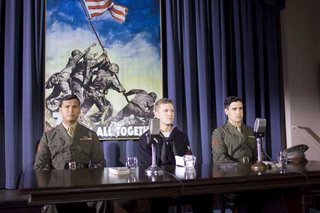Chuck Koplinski Reviews "Flags Of Our Fathers"
The following review is written by Chuck Koplinski for the latest film from director Clint East, "Flags Of Our Fathers."

Flags Of Our Fathers – 3 Stars
Rated R – Running Time- 2:12
By Chuck Koplinski
As he did with the western in Unforgiven, Clint Eastwood attacks the war genre with a realistic and reconstructive lens in Flags of our Fathers, an emotionally harrowing journey into the psyche of a nation and the men it would hold up as heroes. Based on the best-selling book by James Bradley and Ron Powers, the film examines one of the most iconic images of the 20th century --- the flag-raising on Mt. Suribachi at the end of the Battle of Iwo Jima during World War II--- and puts it under the microscope, looking at the circumstances behind its making, the men caught in the middle of it and its exploitation by the American government. While one might expect a traditional sort of war film from Eastwood, who’s aligned himself politically with the right in the past, his fascination with the media and heroism, which has been a recurring theme for him (The Dead Pool, Bronco Billy, In the Line of Fire, etc.), is the focus here. An unvarnished look at how the government can wield the media and what it presents like a deceptive, powerful sword couldn’t by more timely or welcome.
The film’s opening sequences will undoubtedly be compared to Steven Spielberg’s Saving Private Ryan and while there are similarities, each is the reflective of each filmmaker’s distinctive style. Eastwood’s take on the Battle of Iwo Jima isn’t as overtly violent as Spielberg’s look at the D-Day invasion (no distraught soldier wandering around looking for his blown-away arm here) but it is as effective as the violence is seen as just as damaging, senseless and random. The director does a fine job juggling one of the elements that often trips up other filmmakers, namely being able to show how vast this battle was yet make it an intimate experience as well by showing its impact on certain individuals.
The three men Flags centers upon are John Bradley (Ryan Phillippe), Rene Gagnon (Jesse Bradford) and Ira Hayes (Adam Beach) the only survivors among the six who were captured in Joe Rosenthal’s famous photograph. Shifting from the physical turmoil of the battlefield to the emotional scars these men were forced to come to terms with, the story recounts how this trio were feted and honored as American heroes, all in the name of raising money for the war effort through the sale of bonds. While the sights we’re treated to on the battlefield are overwhelming, the same can be said of the massive bond rallies held, particularly at Chicago’s Soldier Field. As they are staged, it’s easy to see how these three would become overwhelmed by the intense focus on their impulsive act to be in Rosenthal’s shot and start to question their so-called heroism. While Gagnon embraces the notion, Bradley and Hayes are less comfortable with this form of instant celebrity and both try to cope with it in their own self-destructive manner.
If Eastwood has a fault as a filmmaker it is that he seldom knows when to call “cut” at the right time. His tendency to let scenes run on too long is well-known and while it does not bog down Flags as it has some of his other works, the movie does move a might slow at times. Even more troubling here is the fractured narrative structure that William Broyles Jr. and Paul Haggis employ that uses flashbacks throughout. While it is initially engaging to see Bradley, Gagnon and Hayes attempt to cope with the post traumatic syndrome they suffer from and the memories that result from it, this tactic eventually becomes taxing and prevents the film from building up the sort of momentum a powerful climax requires.
Rarely do we get films as complex as this out of Hollywood let alone one that questions many of the archetypes cinema has helped perpetuate. Not only does Flags point out once more the futility of war and the far-reaching affects it has on its survivors long after the final shot has been fired, but it also questions the public’s hunger for something simple and pure in the midst of chaos and ambiguity. That dubbing someone a “hero” would have such a detrimental toll on the individual is hardly revolutionary but one we forget all too easily.


